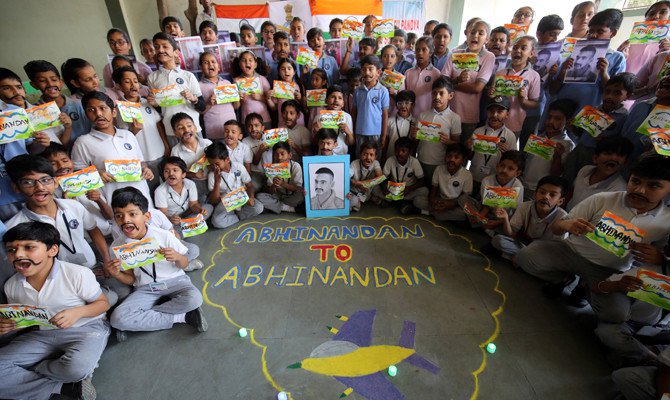Voices of peace rise in India after Pakistan releases captured pilot

Hundreds of scholars, intellectuals and citizens in India on Saturday called for restraint and a de-escalation of tension following weeks of hostility with Pakistan.
Relations between the two countries have been fraught since Feb. 14, when 40 Indian troops were killed in a suicide attack in Indian-held Kashmir.
New Delhi blamed a Pakistan-based militant group and launched a strike inside Pakistani territory. Islamabad launched its own incursion that ended in the capture of Indian pilot Abhinandan Varthaman.
His release from captivity dominated Indian headlines on Saturday, giving space for calls for peace that had been otherwise subdued since the attack.
“We appeal to the governments on both sides to refrain from further hostilities, overt or covert, and to resolve their differences within the framework of international law and human rights,” said the statement signed by 500 prominent Indian citizens.
“Confrontation would resolve nothing — neither the tensions between India and Pakistan, nor the Kashmir dispute. On the contrary, it would aggravate tensions and delay the process of conflict resolution.”
The statement added that “the climate of jingoism” obscured the truth that the principle victims of such conflict were Kashmiris, and it led to “the erosion of democracy including the freedom of expression and dissent.”
The All India Democratic Women Association (AIDWA) also appealed for calm.
“A war between two nuclear-armed countries like India and Pakistan portends grave danger to the people of India, Pakistan and the whole of South Asia,” Kavita Krishnan of AIDWA told Arab News.
She appealed to the “peace-loving people of both countries to reject the competitive jingoistic clamour in their respective media and strengthen the prospects of peace.”
The pilot has undergone medical tests and a debriefing at the Air Force Central Medical Establishment, a specialist evaluation centre for India’s armed forces aircrew, since he was released.
He was brought to New Delhi Friday night and admitted to the hospital for a check-up. Indian Defense Minister Nirmala Sitharaman visited him and asked about his time in Pakistan captivity.
Varthaman was arrested by the Pakistani army on Wednesday, when his fighter jet was hit by a Pakistani missile across the Line of Control in Kashmir and he ejected in the enemy country.
Some media reported him as saying that he had not been subjected to physical torture while in captivity, but that it had been a mental ordeal.
Indian Prime Minister Narendra Modi praised the pilot’s bravery.
“The world takes note of what India does. India has the strength to change the meaning of words in the dictionary. Abhinandan once used to mean welcome and now the meaning of Abhinandan will change,” he said at a public function in the capital.
Pakistani Prime Minister Imran Khan had announced the pilot’s release as a peace gesture in a bid to defuse the tension.
Mumbai-based political analyst and columnist, Sudheendra Kulkarni, said that Varthaman’s return was an important development.
“The credit for this goes to Imran Khan and the international community that urged both the countries to calm down,” he told Arab News.
“I will tell both India and Pakistan that war is not an option. War is itself a problem, how can it be a solution? A consistent dialogue is the only option. India and Pakistan should work together to free South Asia from the menace of terrorism and religious extremism. Both countries should open many channels of communications.”
